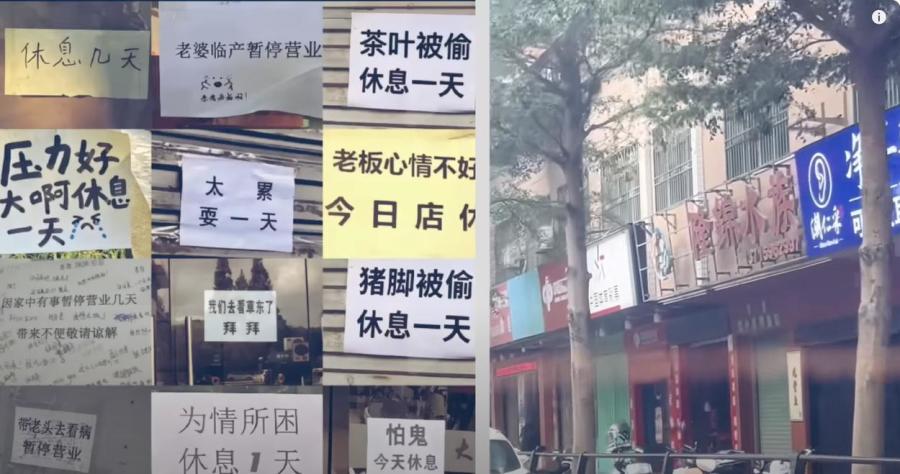Many businesses in Guangdong have posted a variety of humorous or creative excuses for their closures, such as "Afraid of ghosts," "Couple arguing," or "Boss in a bad mood" (screenshot from People News video).
[People News] The case of Beijing mobile gaming company executive Xing Yanjun, who died in a "designated residential surveillance" facility, has seen new developments. While Inner Mongolia police have reportedly agreed to close the case, the family is pursuing accountability. The incident has reignited public debate over the legitimacy of the Chinese police’s cross-regional operations and the use of "designated residential surveillance."
According to a December 15 report by Chinese media outlet Caixin, 247 days after Xing Yanjun's death, the Public Security Bureau of New Barag Left Banner in Hulunbuir, Inner Mongolia, decided to drop the case involving the “Competitive Alliance Texas Hold’em Poker APP” on grounds of “no criminal activity.” Xing’s brother, Xing Yuejun, confirmed that his brother’s body was cremated on December 13. Yicai further reported that after Xing's death, the Inner Mongolia Procuratorate and the Tongliao Municipal Procuratorate set up special teams to investigate. According to the family’s lawyer, efforts to seek accountability for Xing’s death will align with the family’s wishes.
Radio Free Asia previously cited legal documents provided by Xing’s brother and lawyer, showing that Xing was criminally detained on November 8, 2023, by the New Barag Left Banner Public Security Bureau on suspicion of "operating an illegal casino." He was then placed under “designated residential surveillance” on December 15, 2023. On April 3, 2024, Xing was found dead at the surveillance site.
Observers have noted that "designated residential surveillance," though stipulated as a compulsory measure under China’s Criminal Procedure Law, was originally intended for individuals without a fixed residence, primarily to ensure the smooth progress of legal proceedings. It was not meant to be used for evidence collection or detention. However, in recent years, with the involvement of Party disciplinary and supervision agencies, the use of this measure has become increasingly common. Additionally, cross-regional law enforcement practices by Chinese police appear to be evolving.
Public scrutiny has raised questions about the jurisdiction of the Hulunbuir police, given that Xing’s company and household registration were both based in Beijing, and he had no business activities in Inner Mongolia. Why did they have the authority to handle the case of Xing and others over 1,500 kilometers away, including freezing his company’s and related individuals’ bank accounts?
A report by Taiwan’s Central News Agency on Sunday suggested that Xing was likely one of the victims of the police's recent “distant fishing” operations. The underlying cause, according to the report, lies in China’s economic downturn and local governments’ financial struggles. Amid this backdrop, Chinese law enforcement agencies have increasingly resorted to cross-regional crackdowns on businesses as a means to meet revenue targets.










News magazine bootstrap themes!
I like this themes, fast loading and look profesional
Thank you Carlos!
You're welcome!
Please support me with give positive rating!
Yes Sure!